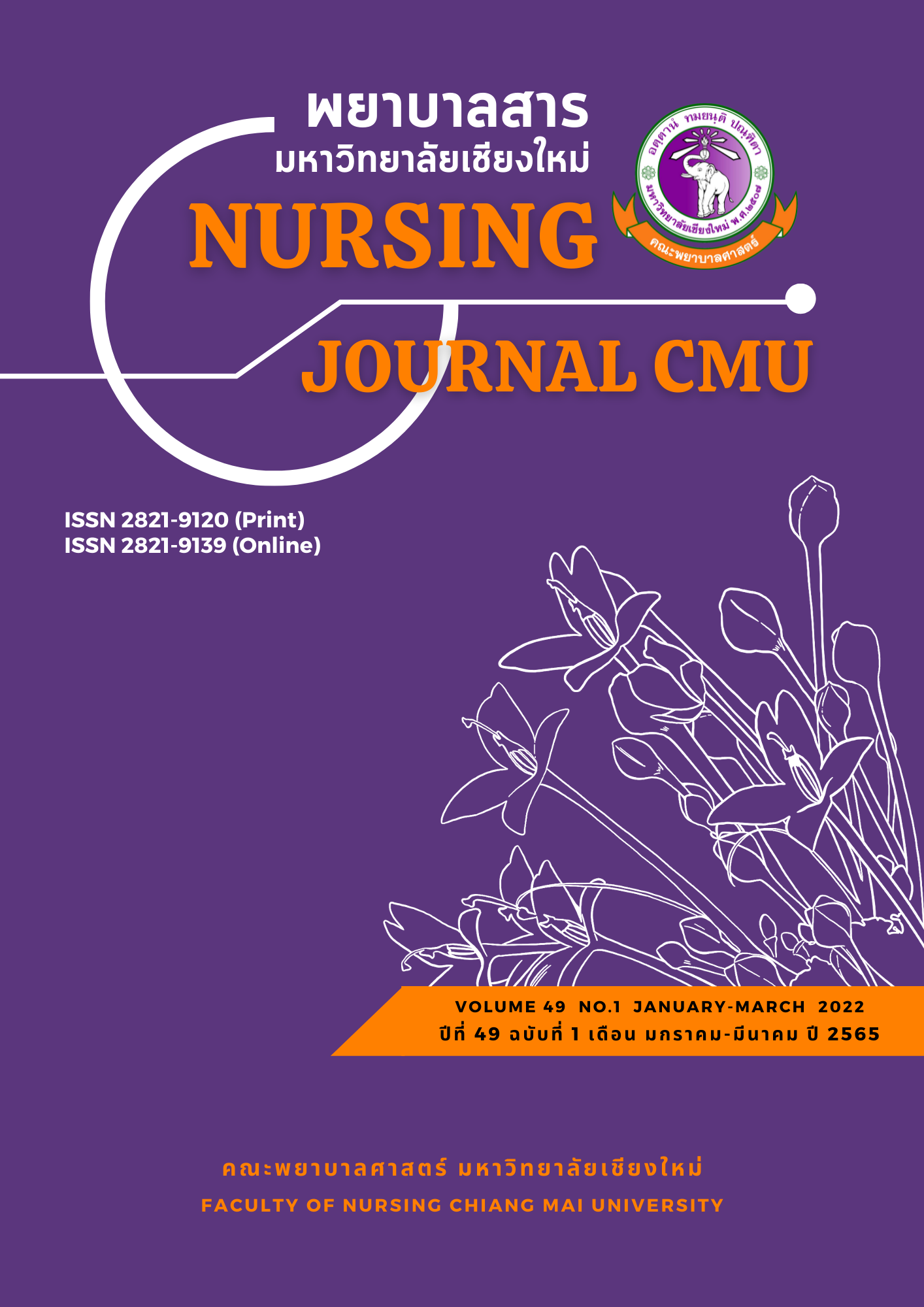Health Literacy and Self-Management Among Older Persons with Metabolic Syndrome
Keywords:
Health Literacy, Self-Management, Older persons with metabolic syndromeAbstract
Older persons with metabolic syndrome having a high self-management ability are more likely to reduce the chance of developing complications. This correlative descriptive research aimed to investigate health literacy, self-management, and the relationship between health literacy and self-management among older persons with metabolic syndrome. The participants were 88 older persons with metabolic syndrome who had received medical treatment at the Tambon Health Promoting Hospital, Doi Saket, Chiang Mai during June - August 2021. The data collection tools were questionnaires regarding the health literacy of older persons with metabolic syndrome and the self-management of older persons with metabolic syndrome. Data were analyzed using descriptive statistics and Pearson’s product-moment correlation.
The results revealed that older persons with metabolic syndrome had health literacy and self-management at a moderate level. Furthermore, health literacy positively correlated with self-management at a moderate level with a statistical significance of 0.01 (r = 0.661).
The results of this study show basic information for health care personnel to plan for self-management enhancement among older persons with metabolic syndrome.
References
Burns, N., & Grove, S. K. (2009). The practice of nursing research conduct, critique, & Utilization.(5th ed.). Philadelphia: Elsevier.
Cohen, J. (1988). Statistical power analysis for the behavioral sciences (2nd ed.). Hillside, NJ: Lawrence Erlbaum Associates.
Creer, T. L. (2000). Self-management of chronic illness. In M. Boekaerts, P. R. Pintrich, & M.Zeidner (Eds.), Handbook of self- regulation (pp. 601-629). Academic Press. Retrieved form https://doi.org/10.1016/B978-012109890-2/50047-0
Daemayu, A., Panuthai, S., & Jantasopeepun, P. (2020), Correlation between health literacy and self-management amongst older Thai Muslims with hypertension. Journal of Thailand Nursing and Midwifery Council, 35(3), 87-107. (in Thai)
Ekapolakan, W. (Ed.). (2008), Report of the Thai Population Health Survey by Physical Examination no.4. Nonthaburi: Institute of Health Systems Research. (in Thai)
Ekapolakan, W. (Ed.). (2014), Report of the Thai Population Health Survey by Physical Examination No.5. Nonthaburi: Institute of Health Systems Research. (in Thai)
Pfeiffer, E. (1975). A short portable mental status questionnaire for the assessment of organic brain deficit in elderly patients. Journal of the American Geriatrics Society, 23(10), 433-441.
Ghafoor, E., Riaz, M., Eichorst, B., Fawwad, A., & Basit, A. (2015). Evaluation of diabetes conversation map education tools for diabetes self-management education. Diabetes Spectrum, 28(4), 230-235. doi:10.2337/diaspect.28.4.230
Grundy, S. M. (2016). Metabolic syndrome update. Trends in cardiovascular medicine, 26(4), 364-373.
Ishikawa, H., Takeuchi, T., & Yano, E. (2008). Measuring functional, communicative, and critical health literacy among diabetic patients. Diabetes care, 31(5), 874- 879.
Khamchata, L., Wattana, C., & Harnirattisai. (2017), The effects of a self-management program on self-management behaviors, waist circumference, blood sugar level, and cardiovascular disease risk among persons with metabolic syndrome. Nursing Journal, 44(3). 65-76. (in Thai)
Khumthong, T., Potisiri, W., & Kaedumkoeng, K. (2016), Factors Influencing Health Literacy for people at risk of Diabetes Mellitus and Hypertension of Uthai Thani and Ang Thong. Veridian E-Journal, Science and Technology Silpakorn University, 3(6), 67-85. (in Thai)
NCD Countdown 2030 collaborators (2018). NCD Countdown 2030: Worldwide trends in non-communicable disease mortality and progress towards Sustainable Development Goal target 3.4. Lancet (London, England), 392(10152), 1072–1088. doi.org/10.1016/S0140-6736(18)31992-5
Noppakraw, J., Chintanawat, R., & Khampolsiri, T. (2020), Health literacy and self-management in older persons with type 2 diabetes mellitus. Nursing Journal, 47(2), 251-261. (in Thai)
Nutbeam, D. (2000). Health literacy as a public health goal: A challenge for contemporary health education and communication strategies into the 21st century. Health promotion international, 15(3), 259-267.
Polit, D. F., & Beck, C. T. (2004). Nursing research: Principles and methods. Philadelphia: Lippincott Williams & Wilkins.
Rosenzweig, J. L., Bakris, G. L., Berglund, L. F., Hivert, M. F., Horton, E. S., Kalyani, R. R., ... Verges, B. L. (2019). Primary prevention of ASCVD and T2DM in patients at metabolic risk: An Endocrine Society clinical practice guideline. The Journal of Clinical Endocrinology & Metabolism, 104(9), 3939-3985.
Siraprapasiri, P. (Ed.). (2020), Guide to palliative and end-of-life care for medical personnel. Nonthaburi: Department of Medical Services. (in Thai)
Sirikutjatuphon, K., Wirotrat, W., & Jitmontree, N. (2017), Factors predicting self-management behaviour of elderly type 2 diabetes patients. Thai Journal of Nursing Council, 32(1), 81-93. (in Thai)
Stenholm, S., Koster, A., Alley, D. E., Visser, M., Maggio, M., Harris, T. B., ... Ferrucci, L. (2010). Adipocytokines and the metabolic syndrome among older persons with and without obesity: The In CHIANTI study. Clinical endocrinology, 73(1), 55-65.
Sumalrot, T., & Suksawai, H. N. (2015), Aging in the world of work: Biopsychosocial perspectives. Panyapiwat Journal, 7(1), 242-254. (in Thai)
Downloads
Published
How to Cite
Issue
Section
License
Copyright (c) 2022 Nursing Journal

This work is licensed under a Creative Commons Attribution-NonCommercial-NoDerivatives 4.0 International License.
บทความที่ได้รับการตีพิมพ์เป็นลิขสิทธิ์ของวารสารพยาบาลสาร
ข้อความที่ปรากฏในบทความแต่ละเรื่องในวารสารวิชาการเล่มนี้เป็นความคิดเห็นส่วนตัวของผู้เขียนแต่ละท่านไม่เกี่ยวข้องกับมหาวิทยาลัยเชียงใหม่ และคณาจารย์ท่านอื่นๆในมหาวิทยาลัยฯ แต่อย่างใด ความรับผิดชอบองค์ประกอบทั้งหมดของบทความแต่ละเรื่องเป็นของผู้เขียนแต่ละท่าน หากมีความผิดพลาดใด ๆ ผู้เขียนแต่ละท่านจะรับผิดชอบบทความของตนเองแต่ผู้เดียว






